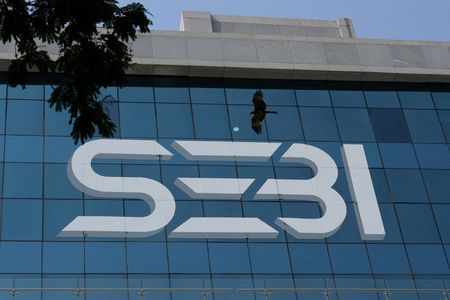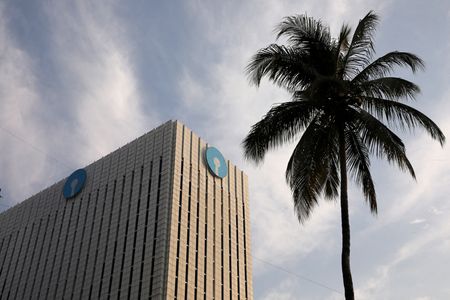By Bharath Rajeswaran
(Reuters) -The Indian markets regulator’s ban on Wall Street trading giant Jane Street has squeezed volumes in the country’s options market, but traders expect activity to snap back as larger investors step in.
The Securities and Exchange Board of India (SEBI) on July 4 barred Jane Street from trading and froze $567 million of its funds for manipulation of stock indexes through derivative positions.
Jane Street told staff it plans to challenge the order, calling the trades in question “basic index arbitrage.”
Since the order, index options premium turnover on the NSE and BSE exchanges declined on a week-on-week basis in four of five sessions.
This metric — representing the total value of premiums paid to buy index options like the Nifty 50 — serves as a key indicator of real capital at play, risk appetite, and overall sentiment in the derivatives market.
While premium turnover rose last Friday, it has fallen in every session this week.
“The ripple effects of the Jane Street episode are expected to linger in the near term, with index options activity showing a noticeable dip as traders reassess risk appetite amid regulatory uncertainty,” said Rajesh Baheti, managing director of Crosseas Capital Services, a Mumbai-based proprietary trading firm.
Baheti said this may be temporary.
“If proprietary trading firms regain confidence in market transparency and regulatory clarity, activity could rebound meaningfully within four to six weeks,” he said.
Proprietary traders have largely stayed on the sidelines since the ban, reflected in persistently low volumes, with both turnover and the number of unique clients in the derivatives segment declining, two analysts said.
“The dip in index options activity reflects growing market jitters, triggered by the Jane Street ban, global tensions, and shifting trade policies,” said Shitij Gandhi, senior research analyst – technicals at SMC Global Securities.
Options market activity may have also declined due to a delay in U.S.
President Donald Trump’s tariff deadline to August 1, which prompted market participants to pull back on aggressive hedging.
LOWER VOLUMES ON BANK NIFTY
Jane Street, SEBI says, traded most aggressively in derivatives linked to the Bank Nifty index and its 12 constituent stocks.
The Wall Street trader’s exit from the market has also pulled down trading volumes in these stocks.
Aggregate trading volumes in the Nifty Bank index have halved in five sessions ending Thursday, dropping to 495.75 million shares from 1.02 billion shares in the five sessions preceding the ban.
“In the very near term, some dent in trading activity is inevitable since Jane Street was a dominant force in derivatives, but this saga alone can’t explain the drop in Bank Nifty volumes,” said Kranthi Bathini, director of equity strategy at WealthMills Securities.
“Once the global markets stabilise and trade worries ease, volumes are likely to bounce back,” Bathini said.
(Reporting by Bharath Rajeswaran in Bengaluru; Editing by Sonia Cheema)









